Written By: Chevron
Goggles may seem like a pain but their benefits far outweigh any frustrations that may come with them. So why should you wear goggles when you swim and are they that helpful?
Related articles: How to Pick the Right Swim Goggles
As a current competitive swimmer, I always wear goggles when I’m training or swimming laps. And in speaking with lap swimmers, about 90% say that they prefer to wear goggles. And having worn them for twenty years, I believe they’re well worth the hassle. Not convinced? Keep reading to learn more about goggles and why you should wear them when you swim.
Disclosure: This post may contain affiliate links, meaning we earn a small commission at no cost to you if you purchase something through one of our links. As an Amazon Associate, we earn from qualifying purchases. Please check out our disclosure page for more information.

Why You Should Wear Goggles When You Swim
1. Protects Your Eyes
Probably the most important reason to wear goggles when you swim is that they protect your eyes. The very definition of a goggle is to protect your eyes! This is especially true for swimmers who will be keeping their eyes open under the water.
And it’s not just water that they protect your eyes from. It’s also the irritation that comes from chlorine (or whatever chemicals are used in your pool). And for some, it can be salt or lake water, depending on which open water you’re swimming in.
Related article: How to Fix Common Swim Goggle Problems
While you can probably skirt by not swimming with goggles in a pool and keeping your eyes open while swimming, we don’t recommend it for the lake or ocean.
If you’re playing at the beach or lake, or floating the river, I would say that you wouldn’t need swim goggles. However, if you plan on opening your eyes underwater at these places, I would highly suggest wearing them for those periods.
The salt water will burn your eyes much more than the chlorine would if you’re attempting to swim with your eyes open. And while lakes lake salt water, they may have more bacteria present and there’s a chance you could end up with an infection.
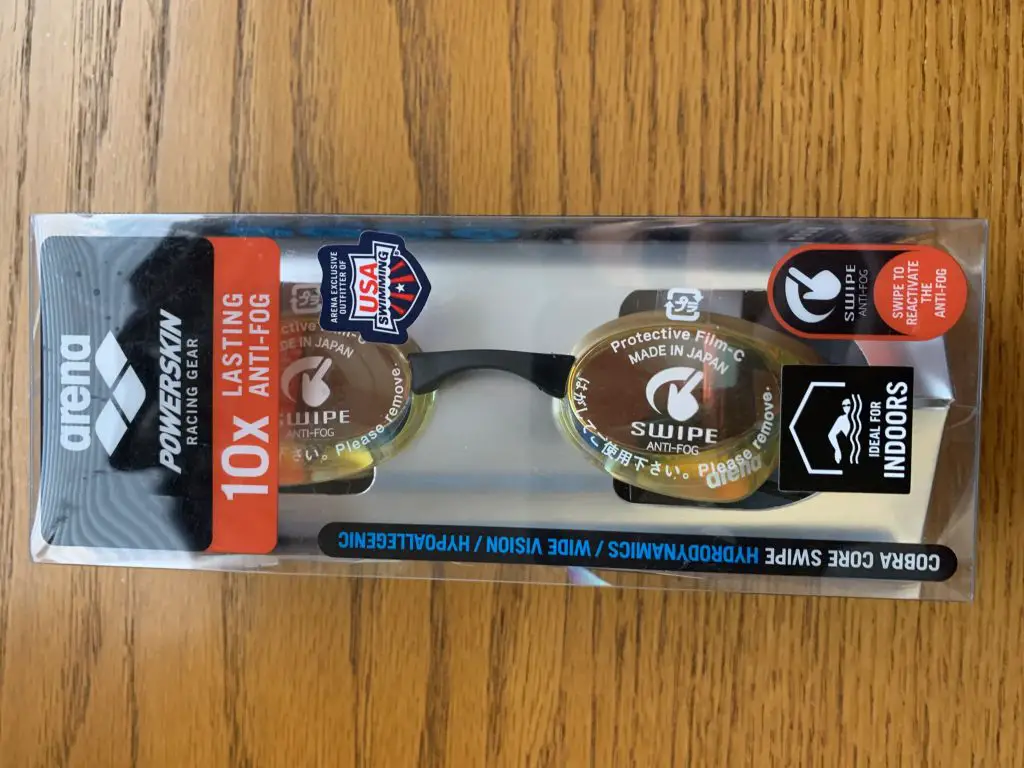
2. Keeps Water Out of Your Eyes
As mentioned earlier, goggles help protect your eyes. They form a tight seal around your eyes to help keep water from getting into your eyes. When you’re splashing around in the pool, a bit of water in your eyes isn’t awful.
But opening your eyes underwater or swimming with your eyes open can cause some pain/irritation later in the day. Especially if you’re doing this long-term.
For some kids, getting water in their eyes can be a large deterrent to putting their face in the water. And can also cause some fear of the water. Wearing goggles when they’re in the pool can encourage them to put their face in the water.
Related article: Quick Guide to Swim Lessons
I recommend that kids try on goggles for the first time at home, as it’s a safe and familiar environment. Having taught swim lessons with younger kids, I’ve found that most kids do not like trying on goggles for the first time at swim lessons or the pool.
And to add insult to injury, they’re usually not sized correctly and start leaking right away. Which only enforces the desire for a child to not wear goggles and refuse to put their face in the water.
If you can, encourage them to wear the goggles in the shower or bathtub. This can help them realize that goggles help keep water out of their eyes. It can also make bath time a bit more fun for a night or two!
And it can help them feel better about dunking their head underwater the next time you’re at the pool!
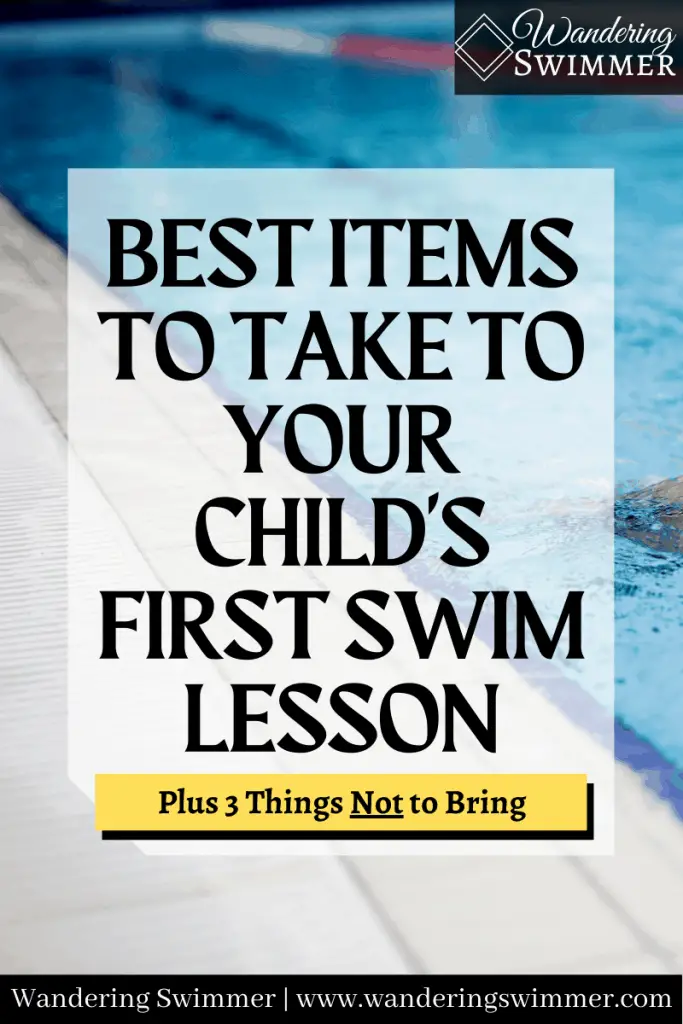
3. Prevents Dry Eyes
Pool water and seawater can dry out more than your skin. They can dry out your eyes too.
Spend a day swimming without goggles and you’ll find your eyes red, dry, itchy, and irritated. They probably won’t bother you too much during your time at the beach or the pool, but you’ll feel it on the drive home.
And you’ll probably have a hard time seeing and driving when your eyes are irritated.
As a kid playing in the pool and always opening my eyes under the water, this wasn’t as big of a deal to me. As an adult though, I dislike having my eyes dry. It makes it harder to focus at work and leaves me irritable during the day.
To help your eyes recover, you’ll need some eye drops to help hydrate them and stop them from itching. I’ve found that once or twice a day isn’t enough to rehydrate them. Sometimes I’ll use them every few hours to help them recover.
4. Protects Your Contacts
Do you wear contacts and plan on lap swimming? I highly encourage you to wear some goggles as they can protect your contacts and your eyes. And if you were to ask my optometrist, he would actually say that you shouldn’t wear your contacts and swim.
It’s incredibly easy to lose a contact (or both) if you keep your eyes open under water while swimming laps. Contacts are way too expensive to lose them every time you go to the pool for a workout or training.
And on the chance you don’t lose the contacts, you run the risk of getting bacteria in your eyes with can lead to an infection.
Hence why my optometrist dislikes me swimming and training with my contacts in.
Another reason to consider wearing goggles when you swim is the potential damage the chlorine or salt water can cause to your contacts.
Chlorine and salt water can dry out your contacts, making them extremely difficult to remove. If not completely ruining them altogether. You run the risk of tearing them or even scratching your eyes.
I’ve been swimming with my contacts for about 14 years now (don’t tell my optometrist!) and I can attest that goggles can protect your contacts and keep you from losing them. That said, I will add an important disclaimer.
If your goggles aren’t fitted correctly and are too loose that they leak, you may still lose a contact. Or you may find that it will roll up behind your eyes. I’ve had a few close calls whenever I had water get into a goggle.
Lastly, if you swim with contacts, I also recommend keeping a back up set of contacts and/or your glasses with you. I always bring glass case with me when I swim and keep an extra pair of contacts. For me, driving without corrected vision is not an option, so I have to keep back ups on hand.
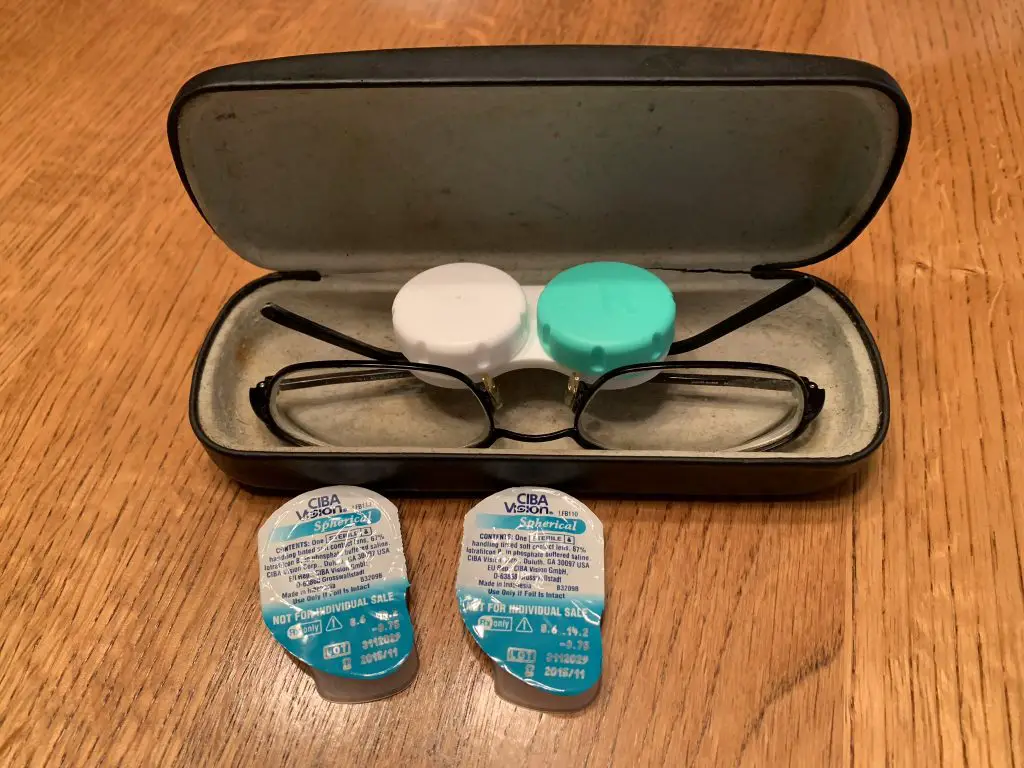
5. UV Protection
One of the biggest challenges of swimming outside is swimming with the sun in your eyes. The sunlight can make it hard to see above or under the water.
Certain goggles though are designed specifically for outdoor swimming. These goggles can help protect against UV rays and also reduce glare from the sun.
When looking for outdoor goggles, consider goggles that have the words ‘mirrored’ and ‘UV protection’. Some goggles now even state ‘for outdoor swimming’. These will be the best options for outdoor swimming.
Some good outdoor goggles to consider are Arena Tracks Mirror and Speedo Vanquisher Mirrored Goggles. I use Arena Tracks for outdoor swimming even when I’m swimming inside as some indoor facilities can be just as bright and indoor goggles will only make it that much brighter.
You can see from the picture below, the goggles on the top are the tinted goggles for outdoors. While the bottom pair are non-tinted for indoors. It makes a difference, I promise!
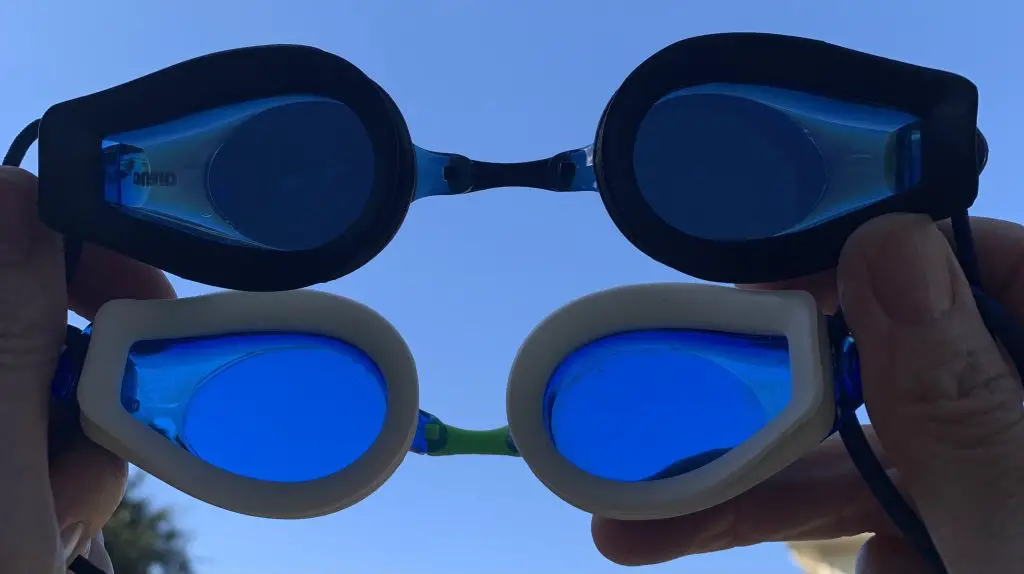
6. See Clear(er) Underwater
While you can see underwater without goggles, wearing goggles makes things much clearer and sharper.
In some ways, this is also a safety feature.
When you can see better underwater, you’re less likely to run into something. Whether that’s another swimmer, a ladder or slide that’s in the pool, or something else in the water. Wearing goggles to see underwater can help keep you from getting injured.
Related article: How to Stop Goggles From Falling Off
Having a clear view underwater is also great for kids learning how to swim. They can see the bottom of the pool and their surroundings. This helps them feel more at ease and realize there’s nothing scary in the water.
And they can see any dive toys! A swim instructor secret is that we
7. Prescription Goggles
If you only wear glasses or decide not to wear your contacts when you swim, prescription goggles can help you see better.
These goggles can be customized to fit your prescription needs. Allowing you to see clearly whenever you’re wearing them. They’re a great alternative to potentially losing contacts or having blurry vision all day.
I used Speedo Prescription Goggles for the first 4-5 years of my swimming career so I could see the clock easier for my workouts.
Of course, one of the downsides of these goggles is that you need to wear them to see. If you take them off between sets or take a break, you’ll go back to your uncorrected vision. This was the reason why I switched to wearing contacts at practice, as my coach started writing workouts on the whiteboard compared to verbally telling us the set.
To counter this, you can always keep a set of glasses nearby, such as on a towel or in a case.
Just be sure they’re well protected so they don’t break. 🙂
Can You Swim Without Goggles?
Still wanting to swim without goggles? It is possible to swim without goggles. If it’s your preference to skip the goggles the next time you’re at the pool, that’s completely up to you. It’s just something I recommend for the safety of your eyes and your long-term comfort.
However, if you’re starting lap or competitive swimming, or trying open water, it’s a good idea to wear some goggles.
As always, happy swimming!
Chevron
Bonus Content:
6 Reasons You Should Wear a Swim Cap: Swim caps are a necessary evil and swimmers love to hate them. But why should you wear a swim cap and what’s the point of them?
How to Prevent Swimmer’s Ear: Swimmer’s ear can be a painful experience if left untreated. Here are 4 options to help you prevent swimmer’s ear and enjoy your summer.

Want to Improve at the Pool?
Join swimmers and swim parents to receive my free newsletter and receive a free Swimming Glossary e-book as a thanks!
Every month you’ll receive tips and coaching to help you find success at the pool.
About
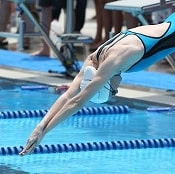
Chevron is a current competitive swimmer with almost 20 years of experience at the local, national and international level. A current USA Swimming and US Masters Swimming athlete, she’s committed to providing guidance to all levels of swimmers and believes that everyone should know how to swim.
great blog for swim lovers